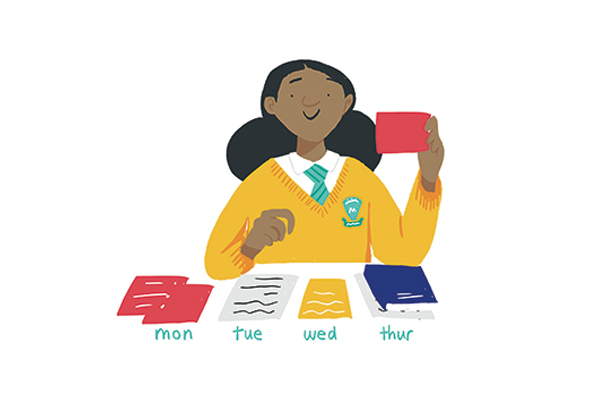After an extensive discussion with some one of our Headteachers and one of our expert psychologist, we have put together just 8 of their top tips for looking after your teen’s education and wellbeing while schools are closed.
1. Hold a weekly family meeting
With kids learning from home and parents working from home – and socializing extremely limited (freezing cold walk in the rain, anyone?), it’s easy for everyone to get a bit of cabin fever right now. Some kids might argue lots, while others will bottle things up. Either way, making a slot for a weekly family meeting can be a really effective way to park frustrations or particular feelings for a few days, until you all sit down and discuss it. You can make an agenda over the course of each week too, writing down things to talk about as they come up in between meetings. This is a way for families to bond as you look for solutions together – and save on the tears beforehand. It can help kids learn to control their emotions and bring calm during the week as they know they have an outlet to discuss what’s bothering them.
2. Label “zones” at home

If you’ve got more than one child at home, chances are they’ll each have their own set of needs each day. A teen will need quiet time to focus on their studies, while a 9-year-old will need somewhere to work on an Art project (and some adult supervision!). Grade 3 trumpet practice and A Level Physics revision – also a tricky combo. With everyone home, creating different “zones” in your house for specific types of activities can be a really effective way to let everyone concentrate on the work they need to.
You can work with the space you’ve got too – even a corner of a landing could be made into a quiet study corner. Your kitchen table could be the reserved creative/noisy/chatty zone, and another room could be the “taking video calls” zone. A system that means kids get to move around a bit during the day can also help keep their studies fresh, rather than staying glued to the same seat from morning till evening.
3. Stick to a timetable

As a parent, your role during homeschool – especially for teens – isn’t to double up as a teacher. Unless you’re a total whizz in one of your teen’s subjects, the way you can really support your teen’s learning is by helping them stick to the timetable their school has provided. On top of that, you can add morning, lunchtime, and after school elements to their weekly routine.
This could be a daily habit like a walk before registration, a weekly slot for a movie night, or time set aside for them to call their friends. It’s easy for time to all blend into one during the lockdown, so splitting up the weeks and the days into lots of chunks can help boost everyone’s energy, productivity, and mood.
4. Prioritise your relationship

Whatever happens during this tough time, Alicia advises, you want to come out of it with a good relationship with your child. That can be easier said than done if you feel you need to encourage (/nag) them to keep up with their work, while they feel overwhelmed by the pressure. Now is a good time to take off some of the pressure. Letting messy rooms be messy, scruffy hair be scruffy and a chaotic cooking style be, well, chaotic, can help reduce tension at home while everyone focuses on getting through the lockdown.
Making time for 1×1 time with each child is another difficult – but valuable – way you can keep everyone feeling supported. Housework tasks such as hanging up the laundry, matching up socks, or putting away the dishes can be doubled up as opportunities for time with each member of your family where just the two of you can talk about what’s on their mind. Now that’s what we call multi-tasking.
5. Make time for exercise

As most of us know by now, it’s too easy to go days during lockdown without walking more than about 12 steps (that is always a lovely scenic stroll from the living room to the kitchen and back again though). For teens, moving around is a crucial way to keep their mood, focus, and energy levels high, so they’re ready to learn and more resilient day-to-day. If they’re not one for a run or a home workout though, there are lots of ways to stay active without becoming an athlete.
Stargazing, birdwatching, and wildflower spotting are all outdoor activities that will get everyone moving without even mentioning the words “rep” or “squat”. A 1×1 walk together is another nice way to bundle quality time with each child while making sure they move about. Even creating a walk “to school” in the morning – in other words, a walk before the school day begins is an excellent way to wake them up and boost their energy levels first thing (just like the school run, if you can remember what that was like).
6. Listen to the teachers

Even though schools are closed or partially open, your kids’ teachers are still absolutely there to offer answers, support, and resources to keep their learning on track. Especially if your teen’s in their GCSE or A-Level year, if they’re in doubt or worried about anything to do with their learning, they should tell their teacher. Whatever system they’ve been given to communicate – email, Microsoft Teams, Google Classroom – sending them a polite message that clearly sums up what they’re unsure or worried about will give their teacher the info they need to help them out.
7. Encourage them to talk about their feelings

As the saying goes, a problem shared is a problem halved. But knowing how to put your feelings into words is a skill you can help your teen learn through practice. Encouraging your teen to practice describing how they feel with you will help them avoid outbursts or building up anxiety. If you can work out some temporary solutions to make them feel better, great. But simply reminding them that it’s completely normal to feel a bit down or worried at the moment (who isn’t?) can also be soothing.
8. Keep powering through

We know it’s not easy learning from home, but unlike when schools closed last year, it’s really important that teens keep making their way through their courses. If they’re in a GCSE or A-Level year, each piece of work that they submit to their teacher will help inform their final grade. That’s not to say that if they make a mistake in their homework they’ll be doomed, but rather that your teen has lots of opportunities this term in particular to prove themselves. The key is to listen to what their teachers are asking of them now and sticking with their studies until they’re done. You can read more about what your teen can do to get good grades in 2021 in our recent blog.
If you’d like some more advice on keeping your teen’s education on track, have a read of our blog on how to set up homeschooling. For tips on managing everyone’s different needs, how to adjust homeschooling for kids of different ages has advice from a mum who’s in the thick of it.
You can hire an exam preparation tutor for your kid’s examination future or reach any of them, call: 08177772980 or Chat: https://wa.me/message/76YBC6NAGGIQF1. You can visit: https://edupoint.org.ng/online-classes-2/Book a slot: https://edupoint.setmore.com/
EduPoint…Delivering world-class learning by world-class Tutors!


Leave a reply